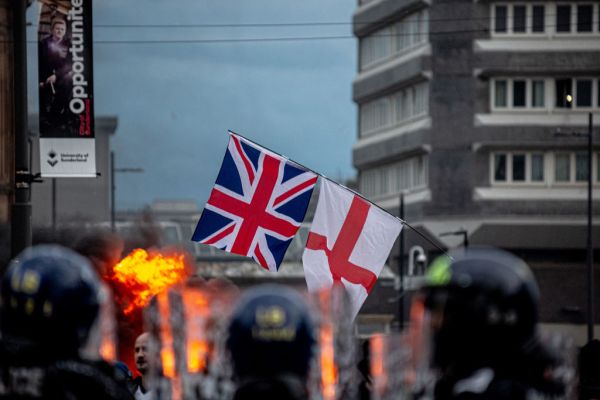Britain is beset by a feeling of listless decline.
There is a sense that nothing works anymore, that the taxation the government collects (at its highest level since 1948) is being squandered, and that the country’s best days are firmly behind it. Against this backdrop, a degree of malaise is perhaps to be expected: The Conservative Party, recently thrown out of office after 14 uninterrupted years in power, has left public services and the public finances in a wretched state.
Yet the prevailing sense of pessimism feels deeper, more enduring. Few appear to believe that Prime Minister Keir Starmer’s new Labour government can reverse the decline. The sense of despair is felt most acutely in parts of England where racist rioting erupted in August. The initial spark for the violence was the senseless and horrific murder of three young girls who were stabbed at a Taylor Swift-themed dance and yoga session in the northern seaside town of Southport on July 29. Eight other children and two adults were seriously injured in the brutal and senseless attack.
In the immediate aftermath of the murders, far-right social media influencers used social media to spread false rumors that the main suspect was a Muslim asylum seeker named Ali Al-Shakati. Posts claiming that the attacker was a Muslim, a refugee, a migrant, or a foreigner received 27 million impressions on X in the 24 hours after the killings. In response, far-right groups descended on Southport the day after the stabbings and attacked a mosque, vandalized homes, and looted local shops. Over the ensuing days, anti-immigrant riots spread to other towns and cities in England and Northern Ireland.
A mob of white men chanted, “We want our country back” and “get them out” as they set fire to a hotel that housed asylum seekers in the northern town of Rotherham. In Tamworth, Staffordshire, and Yorkshire, groups of men attempted to storm more hotels housing asylum seekers. The violence—the worst rioting Britain has experienced in at least 13 years—prompted a U.K. judge to release the name of 17-year-old Axel Rudakubana as the main suspect in the Southport killings, lifting an anonymity order that had been in place because of his age. Rudakubana was born in Cardiff, Wales, and is not a Muslim.
Rising resentment in the U.K.
Social media must share some of the blame for the disorder that followed the killings in Southport. It is clear that X has a disinformation problem under the ownership of Elon Musk—Musk himself boosted Tommy Robinson, a far-right activist and high-profile spreader of disinformation about the attacks in Southport. Yet social media is the bugaboo for just about everything nowadays, and there are more profound causal factors at play when it comes to explaining the riots. This is clear from a cursory look at where the worst outbreaks of violence occurred.
“The idea that the violence that rocked the U.K. this summer was driven solely by concerns about multiculturalism and immigration is hard to square with the reality that some of the worst outbreaks of disorder occurred in places with relatively little diversity.”
Seven of the U.K.’s most deprived areas experienced unrest in August. These were Blackburn, Blackpool, Hartlepool, Hull, Liverpool, Manchester, and Middlesbrough. Sections of the right-wing media have sought to portray the unrest as motivated by “legitimate concerns” about immigration. It is a familiar lament: Britain’s borders are too porous, multiculturalism has failed, politicians refuse to listen, and the frustrations of the white majority have inevitably boiled over in the streets. Immigrants are an effective scapegoat for people who feel victimized by remote and abstract economic forces.
It is true that a sizable number of people in Britain are unhappy with current levels of immigration. Net migration was unusually high in 2023 at 685,000, driven by an increase in non-EU citizens coming to the U.K. Many of these people came to Britain as international students or on work visas, particularly for work in health and social care. Moreover, anti-immigrant sentiment is not as pervasive as the violence might suggest. A recent survey found that 40 percent of Britons think immigration has had a positive impact on the country compared to 35 percent who disagree.
Opposition to immigration has risen compared to a few years ago. In the same survey, a slight majority (52 percent) said they would like to see immigration reduced. Yet opposition to immigration remains lower than it was before Brexit, and the Conservative Party lost the recent general election while running on a “Stop the boats” campaign slogan (a reference to migrants illegally crossing the English Channel in small vessels).
Further, a large majority of the British public has been revulsed by the recent riots. A recent survey by YouGov found that 85 percent of the public opposed the recent unrest. Voters for Reform—the right-wing populist party led by Nigel Farage—was the only group showing any significant level of support for the riots, at 21 percent.
The idea that the violence that rocked the U.K. this summer was driven solely by concerns about multiculturalism and immigration is hard to square with the reality that some of the worst outbreaks of disorder occurred in places with relatively little diversity. Hartlepool in the north of England, which saw some of the worst rioting, is 96.6 percent white British. In Rotherham, where rioters tried to torch a Holiday Inn Express that they believed contained refugees, 91 percent of the population identifies as white. The population of Blackpool, another epicenter of the recent disorder, is 94.7 percent white.
Opposition to immigration may be one causal factor, but so is the gradual breakdown of the social contract. Globalization has left behind the aforementioned towns and resentment is being directed at those assumed to be its chief beneficiaries—a Brahmin-like political “elite,” the media, and the usual historical scapegoats: foreigners and immigrants. That the previous government often chose to put up unprocessed asylum seekers in hotel accommodations—to the tune of 8.2 million British pounds ($10.8 million) a day—in poor areas merely rubbed salt in the wound.
Gains for the far right in Germany.
Other European countries are grappling with similar resentments. In Germany, the Alternative für Deutschland (AfD) beat Olaf Scholz’s Social Democrats into second place in June’s European elections and has been making strong gains in the east of the country over recent years. The party’s program constitutes one long scream of resentment—at immigrants, at Europe, at Ukraine, and at the political “elites” whom they blame for those things. The AfD won almost one-third of the vote in Thuringia, a state of 2.1 million people that is the poorest region in the country, during the state election that took place on September 1. Björn Höcke, the regional leader of the AfD, has called for Germany to make a “180-degree turn” in the way it remembers its past, including the Nazi era.
The recent stabbings across Germany by Muslim migrants—in particular the attack in Solingen, a city of 160,000 people near Cologne, that left three people dead—have also boosted support for the AfD’s anti-migrant agenda. There have been around a dozen Islamist-motivated attacks in Germany since 2000, including one in 2016 in which an Islamist extremist drove a lorry into a Berlin Christmas market, killing 12 and injuring many more. The lead suspect in the Solingen attack, a 26-year-old with suspected links to ISIS, came to Germany from Syria in 2012 as a refugee. His asylum application had failed, and he should have been deported but wasn’t. Just hours after the stabbing, Höcke posted a video on social media with the caption “Höcke or Solingen.” Alice Weidel, the AfD’s national co-leader, responded to the attack by calling for an immediate five-year ban on immigration and naturalization.
Six million people migrated to Germany between 2013 and 2022, and 1 in 5 inhabitants is now foreign-born. Immigration is undoubtedly a source of resentment in parts of Germany, particularly in the east. Before the creation of the AfD in 2013, the anti-Islam group Pegida picked up support in the former East Germany and staged weekly marches in the Saxony city of Dresden, sometimes attracting as many as 20,000 people. Yet in Germany, as in Britain, there are other profound structural factors at play.
The states where the AfD is strongest have much lower rates of immigration than almost anywhere else in Germany. The far-right has enjoyed particular success in places that were once at the beating heart of East German industry. Three decades after the fall of the Berlin Wall, while the gap between western and eastern Germany has narrowed, those in the east still lag behind when it comes to after-tax income. According to 2021 figures, east Germans have 11 percent less disposable income than their western compatriots. A recent study found that half of east Germans believe their region is economically stagnating.
Though German Chancellor Olaf Scholz has promised to reduce immigration following the stabbings in Solingen and the surge in the AfD vote, politicians in Germany face a dilemma: The German population is aging while its workforce is shrinking. Experts suggest the country needs about 400,000 skilled immigrants a year to plug labor shortages. A recent poll of 900 German businesses showed a majority see the AfD as a risk factor when it comes to attracting skilled migrant workers to the east of the country. And the malaise of the east appears to be slowly infecting the rest of the German economy, which presently stands on the brink of recession.
Why it’s not just immigration.
Back in Britain, the country is riven by deep fractures between the places where people are doing well, led by London, the southeast, and a few northern cities like Manchester; and the places where they are not, including small towns and rural areas—mainly but not exclusively in the north of England. A higher-than-average percentage of people living in so-called left-behind towns like Blackpool are in poor health and are more highly dependent on public services such as the National Health Service (NHS), which is itself highly dependent on migrant workers. Patient waiting lists in the NHS have grown four times faster than the number of nurses recruited and almost 12 percent of nursing vacancies are currently unfilled. Britain’s reliance on migrant workers is not going to end any time soon.
It is noticeable that the rioting that shook Britain in August was most pronounced in once prosperous parts of the country that have never fully recovered from the deindustrialization policies of the 1980s and ’90s. According to a 2023 report by the IPPR think tank, the U.K. is the world’s most regionally unbalanced advanced economy. Most of the U.K.’s best-performing regions in terms of GDP are in London and surrounding areas. Manufacturing and industrial jobs have been replaced by work in knowledge-intensive and service industries, which advantage university graduates over less-educated workers. As industry has disappeared, the social fabric has very often been shredded.
The institutional affiliations and support networks that existed alongside the industries of the past have mostly withered away. The trade union movement is a husk of its former self—there are now just 6.4 million people who are members of trade unions in the U.K. down from a peak of 13 million in 1979—and churches and social clubs sit empty (in the decade since 2009, church attendance has fallen between 15 and 20 percent). Nowadays many working class people get their news exclusively from online disinformation hubs.
The August riots prompted much chatter in the British media about the challenges facing multiculturalism. But a more pressing problem for the U.K.—as well as other deindustrialized or deindustrializing nations—may not be how to integrate migrants into the social fabric, but how to reintegrate sections of the native population into a global economy that seems to have little place for them. A failure to do so may see further outbreaks of violence as the “left behind” classes go in search of more radical answers.









Please note that we at The Dispatch hold ourselves, our work, and our commenters to a higher standard than other places on the internet. We welcome comments that foster genuine debate or discussion—including comments critical of us or our work—but responses that include ad hominem attacks on fellow Dispatch members or are intended to stoke fear and anger may be moderated.
With your membership, you only have the ability to comment on The Morning Dispatch articles. Consider upgrading to join the conversation everywhere.